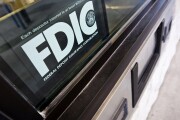
WASHINGTON —
But so-called "targeted insurance" poses significant administrative challenges to work as intended, the agency said, and experts say that getting Congress to grant the FDIC the authority before the 2024 election
"The FDIC's quasi-recommendation that Congress increase coverage for business payment accounts is the kind of idea that could get substantial theoretical support in Congress but is unlikely to progress as Washington becomes consumed by the debt limit," said Ian Katz, policy analyst at Capital Alpha Partners. "We think that for a deposit insurance increase to become law it needs an external push, like another significant bank failure."
The FDIC itself touted targeted insurance as a reasonable means of ensuring that if a bank fails, business clients of the bank aren't collateral casualties of that failure — as was the concern with Silicon Valley Bank's failure. Targeted insurance could diminish moral hazard and reduce the risk of bank runs, the FDIC report said. But any changes to deposit insurance requires Congress to act.
"Business payment accounts are not currently defined in the structure of the deposit insurance system but must be identifiable for the viability of targeted coverage," said an FDIC official at a press conference discussing the report. "Any changes to deposit insurance coverage levels would require congressional action."
While tailored coverage is the preferred path forward, the FDIC report also stressed that implementing such coverage — even with congressional buy-in — poses administrative challenges.
The promise of higher insurance coverage may entice consumers to falsify eligibility, and the agency said targeted coverage could also risk moral hazard if banks compete for business deposits and disregard the risks those deposits can pose.
"Individuals, trusts, or estates may exploit account definitions and adopt [employee identification numbers or tax identification numbers] to obtain higher coverage under targeted coverage," the report said. "In addition, banks and depositors may find other ways to circumvent restrictions placed on accounts with higher coverage. For instance, a bank may offer accounts with no interest but where loyalty 'points' can be accrued and redeemed for gift cards or even cash. Alternatively, or in conjunction, banks could offer lower loan rates to customers who have non-interest-bearing accounts."
Many banking industry experts back the targeted insurance proposal, despite a great deal of the effectiveness of the proposal depending on the efficacy of as-yet-unwritten regulatory language.
"I do not think the operational problems, while notable, are in any way insuperable," said Karen Petrou, managing partner at Federal Financial Analytics. "There are already numerous ways to game coverage the FDIC seeks to control via reporting requirements, etc. If these accounts are non-interest-bearing and available only to entities that are not natural persons or other corporate structures the FDIC wishes to include, this will work as well as most other coverage limits."
Former FDIC lawyer Todd Phillips thinks that while upping coverage could drive banks to take some deposit funding for granted, FDIC's approach would target higher coverage to accounts businesses' use for the convenience of paying expenses like payroll, rather than excess investments seeking high returns.
"Depositor discipline is important, but only to the extent that depositors can fully evaluate the soundness of institutions," Phillips said. "Runs by uninformed depositors don't help anyone. I think that the FDIC's targeted insurance proposal makes a lot of sense and should be considered by Congress."
The banking industry, for its part, emphasized the need to consider how any increases to deposit insurance coverage affects assessment fees.
"Today's FDIC report on options for deposit insurance reform can serve as a useful starting point for a discussion of these important issues," American Bankers Association President and CEO Rob Nichols said in a statement. "It certainly will not be the last word given the need to consider input from the nation's banks that pay for the current system through their assessments, Congress and other key stakeholders before acting on any of FDIC's ideas."
Katz said that there is still a possibility that Congress could take up the FDIC's proposal, particularly if the debt ceiling is raised and the legislature turns to other must-pass funding bills.
"The best chance may be for the idea to get tied to unrelated must-pass legislation late in the year," Katz said. "But even that would require a lengthy debate, including hearings, in Congress. One obstacle could be opposition from some banks, because an increase in insurance limits would require higher FDIC assessments on banks."






